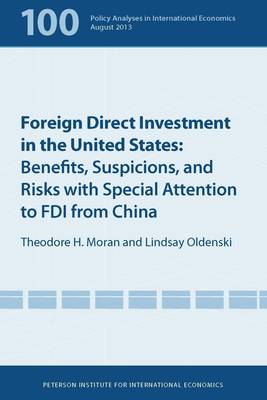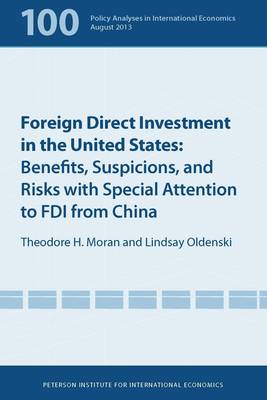
Je cadeautjes zeker op tijd in huis hebben voor de feestdagen? Kom langs in onze winkels en vind het perfecte geschenk!
- Afhalen na 1 uur in een winkel met voorraad
- Gratis thuislevering in België vanaf € 30
- Ruim aanbod met 7 miljoen producten
Je cadeautjes zeker op tijd in huis hebben voor de feestdagen? Kom langs in onze winkels en vind het perfecte geschenk!
- Afhalen na 1 uur in een winkel met voorraad
- Gratis thuislevering in België vanaf € 30
- Ruim aanbod met 7 miljoen producten
Zoeken
Foreign Direct Investment in the United States
Edward Graham, Theodore Moran, Lindsay Oldenski, Paul Krugman
Paperback | Engels
€ 42,45
+ 84 punten
Uitvoering
Omschrijving
The share of the US economy controlled by foreign firms has tripled since the mid-1970s. The authors find that foreign firms appear to invest in the United States mainly to exploit their individual advantages in management and technology - the same reasons why American firms invest abroad - rather than because the United States is now running large deficits and has become a large debtor nation. Foreign-owned firms do not pay lower wages or shift good jobs and research and development away from the United States. Foreign-owned firms and especially Japanese firms do, however, have a marked tendency to import more of their production inputs. The authors warn that the President's new legislative authority to screen FDI on national security grounds could easily be abused, but endorse using this authority to ensure access to critical technologies or production processes including a requirement on some foreign firms to invest in the United States. They propose new international rules to minimize governmental interference and harmonize policies toward multinational firms.
Specificaties
Betrokkenen
- Auteur(s):
- Uitgeverij:
Inhoud
- Aantal bladzijden:
- 224
- Taal:
- Engels
Eigenschappen
- Productcode (EAN):
- 9780881322040
- Verschijningsdatum:
- 1/01/1995
- Uitvoering:
- Paperback
- Formaat:
- Trade paperback (VS)
- Afmetingen:
- 154 mm x 231 mm
- Gewicht:
- 326 g

Alleen bij Standaard Boekhandel
+ 84 punten op je klantenkaart van Standaard Boekhandel
Beoordelingen
We publiceren alleen reviews die voldoen aan de voorwaarden voor reviews. Bekijk onze voorwaarden voor reviews.









